

The boys are losing their shit. Screeching, wheeling and careening into the walls of their cage, making a rattling sound like tiny tornados whipping around a picket fence. Little Budgie Boy and Little Boy Blue, the two parakeets in the care of Paula "The English Psychic" Roberts, have either sensed a really bad omen, or a really good one. From across the room, Aubrey Plaza shoots me a look I can only describe as the platonic ideal of the grimace emoji: teeth gritted, flashbulb eyes widening until they look like two black inner tubes floating in a sea of white. Looks like we're on the same page: bad omen. "Oh, they're just happy it's a sunny day," says Paula, reassuring us in her lyrical British coo.

Jacket and skirt, Belstaff; Shoes, The Row; Sunglasses, Cèline
Plaza and I have come to Paula's apartment on this sunny Friday the 13th for some guidance. It's been three years since the series finale of Parks & Recreation, which turned its cast of misfits into pop cultural icons: Amy Poehler, the feminist hero. Nick Offerman, the paragon of enlightened masculinity. Chris Pratt, the lovable fixer-upper, who, as it turns out, was just a movie studio–mandated personal trainer away from being fixed-up real nice himself. And then there's Plaza, the avatar of millennial malaise. As April Ludgate, Plaza played to a tee the kind of young person who can emotionally devastate a fully developed adult psyche with a mere eye roll. She was so effective in the role that even today, as 33-year-old Plaza arrives for our interview, face hidden behind a pair of black Wayfarers, I flinch. The character imprinted on her—or at least on people's perception of her.
And there was a lot of Plaza in April—she'd been integral to creating the character and shared her sardonic sense of humor. But in truth, Plaza has always been more like Poehler's high-achieving, hyper-productive Leslie Knope. And right now, she doesn't feel as productive as she'd like.
"It's a really good time for me to do this," she says of our visit to Paula, "because I'm at a place in my life where I haven't been in years and years and years: I have no idea what's next. I usually have things lined up, and this is the first time where I really don't. I would love to know what's going to happen to me."
I didn't grow up in Hollywood, but from a young age I just believed it would happen.
A great aunt once told me it's best not to commune with the spirits on an empty stomach, so Plaza and I plan on a quick lunch before Paula's. We meet in an enclave of New York's Upper East Side nestled between the tony stomping grounds of the superrich and a more humble drag of Irish pubs that cater mostly to neighborhood lifers and drunk college kids. It's the kind of area where the sun-bleached brick apartment complexes are all named something-Park or -Manor or -Towers. We duck into a small greasy spoon that Plaza recognizes from her college days in the city, studying directing and writing at New York University's Tisch School of the Arts, then living in Queens and making her rounds on the audition circuit. She remembers that this place makes a mean burger, but we decide to pick at some chicken fingers instead. Between bites, Plaza sings along to the Rihanna song blasting out of the restaurant speakers, stopping mid-sentence to croon "Like diamonds in the skyyy" into my recorder.
When she lived in New York, Plaza was a hustler. "From a very early age, I became addicted to work and being busy, and I don't know where it came from. I could ask Paula, I'm sure she has ideas," she says. "My parents came from nothing. They were both struggling at a young age to make something of themselves, and they both did. Maybe they infused in me that hustle mentality."
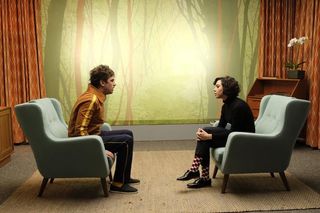
Plaza took classes at the Upright Citizens Brigade Theatre, eventually performing there alongside fellow upstarts John Mulaney and Aziz Asari. She starred in a few online comedy series, and performed stand-up. She auditioned for Saturday Night Live and didn't get it. Instead, she landed a part in Judd Apatow's Funny People and moved to L.A. Soon after she snagged the role on Parks & Rec. "I'm so competitive, and I'm also very fueled by rejection," she says. "The brief time that I did stand-up comedy, there was something about going on stage and failing miserably that was just…I don't know why it just made me feel so inspired."
Stay In The Know
Marie Claire email subscribers get intel on fashion and beauty trends, hot-off-the-press celebrity news, and more. Sign up here.
Even in high school, Plaza was an overachiever. She was president of student council, and named Wilmington, Delaware's "Teen of the Year." Around age 14, Plaza begged her mother to chaperone her on a trip from Wilmington to New York City to audition for a Wizard of Oz open casting call at Madison Square Garden. "I had no chance of getting a part—I mean, no chance in the world," she says. "An open casting at Madison Square Garden? But I guess it just reminds me of how delusional I was at a young age, that I really believed I had a shot." The audition went terribly and Plaza suffered, devastated, through the two-hour train ride back home.
"But there's something about delusions that are really helpful when you want to do stuff that seems impossible," she says now, in retrospect. "I think there's something about the energy of believing that something is real, about putting that energy out in the world. I didn't grow up in Hollywood, but from a young age I just believed it would happen." If Plaza sounds like an instructional DVD of The Secret, that's because she does, in fact, have The Secret on DVD.

From left: Jacket and skirt, Joseph; Jacket, Belstaff; Sunglasses, Cèline
"In one word or two—no more, please—please state the nature of your first question." As far as sherpas through the spirit realm go, Paula keeps it low-key. No headscarf, no turban, just a handsome blonde coif. She wears muted earth tones in flower and bird patterns, and save for a crystal ball–sized whopper of an empress citrine ring on her finger, opts out of obfuscating the experience with razzle dazzle. When we first walk into her lovely, but very normal, apartment, there's little indication that we've walked into a hotbed of spiritual activity, a portal between worlds. There's a print of Monet's "Water Lilies" on the wall alongside paintings of yellow irises and owls done by Paula's artist friends; a life-sized plush dog standing at attention by a comfy-looking couch; and of course the parakeets, which Paula points out are Australian budgerigar.
Only a few trappings of spiritualism loom, and only if you snoop around enough: In prep for our arrival, Paula says she's shoved boxes of her life's work into the bedroom—her paranormal investigations, her notes as the consultant for Noel Coward's "Blithe Spirit," records of her Houdini seance, articles about her in the Journal of the American Society of Psychical Research. Hanging above the table atop which sit Paula's tarot cards is another painting by another friend featuring simple geometric patterns that imply gateways, prisms, and shooting stars. "Esoteric inferences," Paula calls them. A fold-out tray table in the corner holds a ouija board and stuffed dolls in the shapes of a witch and a jack-o-lantern, the home decor equivalent of a deadpan joke.
Plaza slings her oversize herringbone blazer on a chair and sits at the small table, under the painting of esoteric inferences, across from Paula. She's decided on her first question. "Work project," she says, elbows on the table, propping up her face. She twists a thin strand of hair around her finger, and stares seriously at the cards that Paula is flipping onto the table at a rapid clip, her ring cutting invisible constellations into the air. Down comes the Moon, the Lovers, the High Priestess, Strength, Judgement.
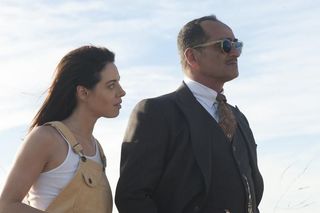
The cards try to assuage Plaza's career anxiety. "Metaphorically, you've traveled a great deal already to get to the point you are at now. You are in a very, very, very good state of mind to move ahead with a project." Plaza points to a card and asks about its meaning. "Now, what this says is that we've got a terrific project here. But how you use the success of that project going forward to make something that lasts in your career is absolutely up to you, in your own hands."
For the past two years, Plaza has starred in FX's Legion, created by Noah Hawley, who brought Emmy-winning Fargo to the cable network. Tonight, the network airs the finale of the second season; a third season was announced just a few weeks after our visit to Paula.
Explaining Legion to a non-viewer is like trying to explain an ayahuasca trip to your straightedge friend. It looks like it's set in the 1960s, but maybe it isn't. The narrative of any given episode has a beginning and an end but only a whisper—or maybe a dozen, deafening, simultaneous whispers—of a linear middle. There's a schizophrenic man with super-powered telekinesis; a woman who switches bodies with anyone she touches; a middle-aged man with a 20-something Native American woman living inside him, who occasionally manifests in the real world to karate-chop some baddies; Jean Smart from Designing Women; and the X-Men—it's produced in association with Marvel—looming in the margins, except nobody is allowed mention them by name (I think for copyright reasons, but I'm not sure). They're all on a hunt for the last-known corporeal body of an apocalyptic evil, like a twisted version of It's a Mad, Mad, Mad, Mad World with a few more Mads added in for taste. Less than half a million people watch it, and less than half of them know what's going on. But that doesn't matter, because it's the most visually enthralling mindfuckery on television.
Then there's Plaza—and "mindfuckery" is her middle name. Actually, it's Christina. But there's no disputing it: Plaza excels at ironic disruption of expectation. She originally auditioned for Syd, the pretty love interest who, except for the whole body-switching super-power, is a quiet and grounded character. Instead, Hawley cast her as Lenny, the show's resident agent of chaos, a role originally meant for a middle-age man. Plaza insisted that Lenny's original, somewhat gendered dialogue—smarmy, crass, with a barstool intellectual's love of old-timey vocab—be kept in tact. The aggressive potty mouth stands in contrast to the blitheness Plaza imbues Lenny with. She spends every episode menacingly traipsing through a veritable wig parade, switching from mental patient to mod to pin-up to beatnik from scene to scene to scene. "The most fun part about my character," says Plaza, "is the freedom to decide: 'You know what? In this weird sequence where I'm hatching a deformed, black, gooey chick out of an egg, I'm going to look like a 1940s movie star. Why? You'll never know. Or maybe you will know later. But not now.'"
I had such an intense reaction to the script that I needed to produce, because I wanted my opinion to matter at every stage.
Last year, Plaza dipped further into producing, and her penchant for subversion found a new outlet. She's starred in several of her longtime boyfriend, writer-director Jeff Baena's, movies, "and I had been involved in a lot of the beginnings of those movies, in a producer sort of role," says Plaza. "And during the third movie that we did together, The Little Hours, I realized, 'Oh, I am producing. I should just own this.' So when I read Ingrid Goes West, I just had such an intense reaction to the script that I needed to produce, because I wanted my opinion to matter at every stage. I didn't want to just say my lines and hope it all comes together."
The Little Hours, a sex farce starring nuns, and Ingrid Goes West, a darkly comic treatise on the perils of living a curated-for-Instagram life, both buck genre expectation, star female leads who can play bawdy comedy and tragicomic angst with equal glee, and earned critical praise. Plaza has produced some television pilots that didn't make it to order, but over dinner one night with Jean Smart, Plaza (who "was obsessed with Designing Women growing up") made a pitch for a project for the two of them. For that, she doesn't need a tarot reading: "Just know that it's gonna change everything."
For every new round with Paula, Plaza burns a hole into the deck with her intent gaze, only occasionally breaking her concentration to pantomime in my direction. Like when she follows up readings on "love partner" and "parents' marriage" with a request for a reading on "baby/pregnancy," and immediately turns her whole body toward me in a challenge to ask her if she's pregnant. I lose the standoff. "Very, very, very commonly asked question," says Paula. "I mean, I just figured, why not?" says Plaza.
Paula's readings on romance cut a complex figure. But for the record, they don't include any tall, dark men coming off critically lauded HBO shows or high profile divorces. Back in March, when Plaza was spotted with Justin Theroux, the two of them became the subject of Internet shippers everywhere. "I don't pay attention to that stuff, but I heard about it," says Plaza. "I heard about only because my boyfriend's mom heard about it first and texted me. I was like, 'Believe me, we're fine.'"
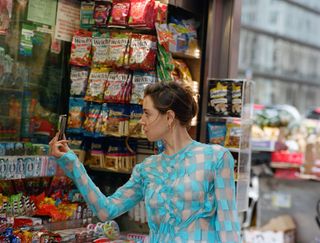
While Plaza keeps her nose out of the tabloids like any actor who values their sanity, she also isn't a keen social media user—she and co-star Elizabeth Olsen only started public Instagrams after filming Ingrid Goes West. But her Instagram presence has recently become a beacon for Parks & Recs fans who, in this fraught world, need a #tbt to when sunny civic pride was all the rage. Take this photo on Rashida Jones' feed celebrating "Galentine's Day" with Plaza, Amy Poehler, and Kathryn Hahn. Or Plaza's photo with Paul Rudd, Natalie Morales, Adam Scott, and Billy Eichner at the March for Our Lives. Plaza had gone down to Washington with a friend for the event—"It was such an important moment for us all to remember that, as adults, we need to back up these kids. We need to support them"—before running into other Parks cast members and deciding to stick together. "It reminds you what a good group of people it was who were a part of that show, and how the show really instilled the idea of just caring about your community and your world in that way," says Plaza. "Leslie would have been so proud."
It reminds you how 'Parks & Rec' instilled the idea of caring about your community and your world.
Before we leave, Plaza lobs a few burning questions at Paula: "Have you ever talked to a ghost?" she yells excitedly while white-knuckling the sides of Paula's table in anticipation. The answer is yes. Next question: "Do you know about the Irish lady who married a ghost pirate?" The answer: "That sounds like something from People magazine." Though, Paula did regale us with a story about traveling to the moon with Ingo Swann via his method of remote viewing, so Plaza can be forgiven for keeping "woman married ghost pirate" filed firmly under "definitely happened."
On the elevator ride down, Plaza gets serious. "I just like that people like her exist in the world," she says. "Whether you believe in it or not, believe whether it's right or it's wrong, or whatever, it's an opportunity for reflection. My mind goes along on a little trip, and it makes me think about what I want. What do I want her answers to be?" As we stroll through the sun on Sixth Avenue, Plaza keeps reflecting. "It's just such a strange career. It's a strange job because you realize that it's never enough, you're never going to be satisfied. There's what I did before, and I now have to do better."
Photography by Katie McCurdy; Styling by Jessica Willis; Hair by Rheanne White using Kusco-Murphy; Makeup by Matin for ChapStick; Nails by Glamsquad.
Nojan Aminosharei is the Entertainment Director of Men's Health and Women's Health, and the Digital Entertainment Director of Harper's Bazaar. He was previously the Entertainment Director of Hearst Digital Media, and before that a Senior Editor at GQ. Raised in Vancouver, Canada, Nojan graduated from NYU with a master’s degree in magazine journalism. The late Elaine Stritch once told him, "What the fuck kind of name is Nojan? I'm 89 years old, I don't have time for that shit.
-
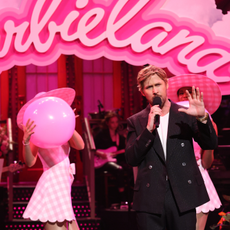 Taylor Swift Endorses Ryan Gosling and Emily Blunt's "All Too Well" Parody From 'SNL'
Taylor Swift Endorses Ryan Gosling and Emily Blunt's "All Too Well" Parody From 'SNL'She loves it.
By Iris Goldsztajn Published
-
 Shakira Makes Surprise Coachella Appearance and a Big Announcement
Shakira Makes Surprise Coachella Appearance and a Big AnnouncementThe iconic singer also performed two songs for the crowd.
By Danielle Campoamor Published
-
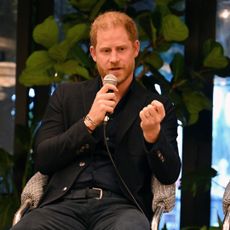 Prince Harry Says Africa Is "In His Soul"
Prince Harry Says Africa Is "In His Soul"The Duke of Sussex took Meghan Markle to Botswana for the couple's third official date.
By Danielle Campoamor Published
-
 The Best Bollywood Movies of 2023 (So Far)
The Best Bollywood Movies of 2023 (So Far)Including one that just might fill the Riverdale-shaped hole in your heart.
By Andrea Park Published
-
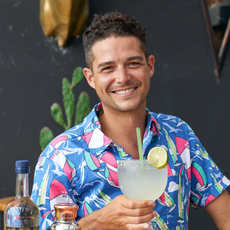 ‘Bachelor in Paradise’ 2023: Everything We Know
‘Bachelor in Paradise’ 2023: Everything We KnowCue up Mike Reno and Ann Wilson’s “Almost Paradise."
By Andrea Park Last updated
-
 Who Is Gerry Turner, the ‘Golden Bachelor’?
Who Is Gerry Turner, the ‘Golden Bachelor’?The Indiana native is the first senior citizen to join Bachelor Nation.
By Andrea Park Last updated
-
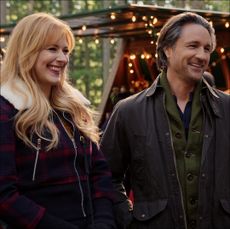 ‘Virgin River’ Season 6: Everything We Know
‘Virgin River’ Season 6: Everything We KnowHere's everything we know on the upcoming episodes.
By Andrea Park Last updated
-
 Kim Cattrall Didn't See or Speak to Her Costars When Filming 'And Just Like That' Cameo
Kim Cattrall Didn't See or Speak to Her Costars When Filming 'And Just Like That' CameoThat's some type of commitment.
By Iris Goldsztajn Published
-
 The 60 Best K-Dramas You'll Be Completely Hooked On
The 60 Best K-Dramas You'll Be Completely Hooked OnWait, how is it already 2 a.m.?
By Quinci LeGardye Last updated
-
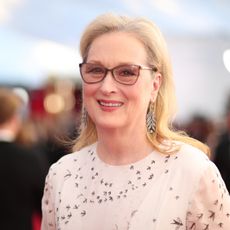 Selena Gomez Revealed Meryl Streep Is Joining 'Only Murders in the Building' Season 3
Selena Gomez Revealed Meryl Streep Is Joining 'Only Murders in the Building' Season 3Fans are losing it.
By Iris Goldsztajn Published
-
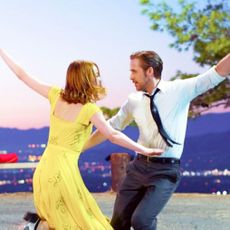 The 60 Best Musical Movies of All Time
The 60 Best Musical Movies of All TimeAll the dance numbers! All the show tunes!
By Amanda Mitchell Last updated